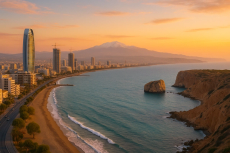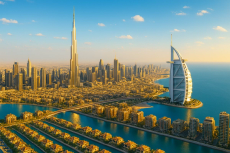Blog • Published on:December 18, 2024 | Updated on:February 5, 2025 • 14 Min
Cheapest Countries to Live: Cost of Living Guide in 2025
Relocating to a country with a lower cost of living can offer significant financial benefits without compromising quality of life. This comprehensive guide explores the most affordable countries to live in 2024, providing insights into living expenses, quality of life, and legal requirements for expatriates.
Top 10 Most Affordable Countries to Live in 2025
Identifying the most affordable countries involves analyzing various cost metrics, including housing, groceries, transportation, and healthcare. Data from sources like Numbeo's Cost of Living Index and Expatistan's Price Index provide valuable insights. The following countries are recognized for their low cost of living:
India - #1
With affordable housing and inexpensive groceries, India offers an average monthly living cost of $300–$500 in most cities, excluding luxury expenses.
Pakistan - #2
Offers low rental and grocery costs, with monthly living expenses for a single person averaging $200–$400.
Egypt - #3
Known for its historical charm, Egypt allows expats to live comfortably with costs as low as $400–$600 monthly.
Sri Lanka - #4
A tropical haven with reasonable living costs, averaging $500–$700 for expats.
Ukraine - #5
Despite challenges, Ukraine remains an affordable destination with living expenses averaging $400–$700.
Vietnam - #6
Offers excellent value, with urban living costing about $500–$800 monthly.
Indonesia - #7
Bali and Jakarta are expat hubs where monthly living expenses start from $600.
Philippines - #8
A vibrant culture and warm climate accompany living costs of $700–$1,000 in major cities.
Malaysia - #9
Kuala Lumpur is a modern, affordable city with costs ranging from $700–$1,000 monthly.
Thailand - #10
Living comfortably in Thailand costs $800–$1,200 per month.
Southeast Asia's Most Budget-Friendly Countries
Vietnam: Low-Cost Living with Modern Amenities
Vietnam combines affordability with modern amenities. Cities like Ho Chi Minh City and Hanoi are major expat hubs, with average housing costs ranging from $250–$400 per month. Street food is cheap and abundant, costing less than $2 per meal.
Malaysia: Affordable Luxury in Southeast Asia
Malaysia offers modern infrastructure and a high standard of living for less. Kuala Lumpur boasts affordable rentals ($400–$700/month) and low transportation costs, making it an attractive option.
Thailand: Balanced Cost of Living for Expats
Thailand’s appeal lies in its balance between cost and quality. Popular cities like Chiang Mai and Bangkok offer vibrant lifestyles, with average monthly living costs of $800.
Cheapest European Countries for Expatriates
Portugal: Western Europe's Budget Haven
Portugal’s mild climate and vibrant culture are complemented by affordable costs. A single person’s average monthly expenses are around $1,200, including rent in smaller cities like Braga.
Bulgaria: Affordable Living in the European Union
Bulgaria stands out in the EU for low living costs. Sofia offers rental rates of $300–$500, and groceries cost about $200 monthly.
Montenegro: Balkan Value for Money
Montenegro offers scenic beauty and affordability, with monthly expenses averaging $1,000 for expats.
Cost Comparison of Essential Living Expenses
Monthly Housing Costs Across Affordable Countries
Housing costs represent the largest expense in most budgets, and choosing the right location can significantly impact your savings. Here’s a comparison of average monthly rental costs for a one-bedroom apartment in city centers:
Vietnam: $250–$400
Cities like Hanoi and Ho Chi Minh City offer affordable apartments with modern amenities.
Thailand: $400–$700
Bangkok and Chiang Mai provide a variety of housing options, from budget-friendly to upscale.
Malaysia: $400–$600
Kuala Lumpur has modern apartments with great facilities, often including gyms and pools.
Portugal: $600–$800
Smaller cities like Braga or Faro offer more affordable rentals compared to Lisbon and Porto.
Bulgaria: $300–$500
Sofia, the capital, is particularly popular for its balance of cost and amenities.
Montenegro: $400–$600
Scenic locations like Kotor or Podgorica offer affordable housing options with stunning views.
Food and Grocery Expenses Worldwide
The cost of groceries and dining out can vary significantly across countries. Here’s an overview:
Vietnam
Monthly grocery costs: $150–$200
Street food is incredibly cheap, with meals costing less than $2, making dining out highly economical.
Thailand
Monthly grocery costs: $200–$250
Local markets and street food stalls offer fresh produce and meals for as low as $1. Western food options may cost more.
Malaysia
Monthly grocery costs: $250–$300
Supermarkets are reasonably priced, and hawker stalls provide affordable and delicious meals at around $2–$5.
Portugal
Monthly grocery costs: $300–$350
Portugal’s local markets and supermarkets provide fresh produce and ingredients for affordable prices.
Bulgaria
Monthly grocery costs: $200–$250
Affordable groceries and local delicacies make it easy to save, with a meal in an inexpensive restaurant costing around $5.
Montenegro
Monthly grocery costs: $250–$300
Local farmers’ markets offer fresh, organic produce at competitive prices.
Transportation and Utility Costs
Transportation and utility expenses are generally lower in these affordable countries.
Vietnam
Public transport monthly pass: $10–$15
Utilities (electricity, water, internet): $50–$80 per month.
Thailand
Public transport monthly pass: $20–$30
Utilities: $70–$120 per month. Electricity costs may rise during hotter months due to air conditioning.
Malaysia
Public transport monthly pass: $20–$30
Utilities: $50–$100 per month, depending on air conditioning use.
Portugal
Public transport monthly pass: $40–$50
Utilities: $100–$150 per month, including heating and internet.
Bulgaria
Public transport monthly pass: $25
Utilities: $70–$120 per month, depending on the season.
Montenegro
Public transport monthly pass: $20–$30
Utilities: $80–$130 per month, with heating costs affecting winter bills.
Quality of Life Factors in Low-Cost Countries
When considering relocating to an affordable country, evaluating the quality of life is crucial. While cost savings are appealing, factors like healthcare, education, safety, and infrastructure significantly impact the living experience.
Healthcare Accessibility and Costs
Healthcare is a top priority when relocating, and many affordable countries provide quality medical services at a fraction of the cost in Western nations.
Vietnam
Offers a mix of public and private healthcare facilities. Expats often prefer private hospitals like Vinmec, where consultations cost around $20–$50. Health insurance plans start as low as $50 per month.
Thailand
Renowned for medical tourism, Thailand boasts world-class hospitals such as Bumrungrad International. Basic health insurance plans are available for $60–$80 monthly.
Portugal
As part of the EU, Portugal provides affordable public healthcare to residents and expatriates. Private insurance plans start from $30 per month, offering faster access to specialized care.
Malaysia
Known for its high-quality yet affordable healthcare system, Malaysia’s private clinics charge around $10–$30 per consultation, with expat insurance plans starting at $50 monthly.
Pro Tip: Research whether your chosen country offers healthcare access through visa or residency programs. For example, Portugal’s Golden Visa grants access to public healthcare.
Education and International Schools
Families relocating to budget-friendly countries must consider education quality and costs.
Thailand
International schools like Bangkok Patana and International School Chiang Mai offer world-class education. Fees range from $10,000 to $20,000 annually.
Malaysia
Known for its excellent international schools, such as the International School of Kuala Lumpur, with annual tuition fees of $5,000–$20,000.
Portugal
International schools, particularly in Lisbon and Porto, cost $7,000–$15,000 per year. Local schools are also an affordable and viable option, especially for younger children.
Bulgaria
Offers a handful of international schools, with tuition fees ranging from $4,000–$10,000 annually, making it one of the cheapest European options for expatriates.
Pro Tip: If you’re planning to relocate long-term, research whether local schools provide bilingual education to help children adapt more quickly.
Safety and Infrastructure
Safety and reliable infrastructure are essential components of a quality living experience.
Portugal
Ranked among the safest countries globally, Portugal has low crime rates and well-maintained public infrastructure, including reliable public transport and high-speed internet.
Malaysia
Urban areas like Kuala Lumpur have a robust infrastructure, but some rural areas may have less reliable utilities. Crime rates are low compared to global averages.
Vietnam
Urban centers like Ho Chi Minh City are generally safe for expatriates, but petty theft can occur in crowded areas. The country is investing in better infrastructure, including metro systems.
Bulgaria
Offers a stable living environment, with safe neighborhoods and modern infrastructure, especially in cities like Sofia and Plovdiv.
Work-Life Balance and Leisure
A balanced lifestyle with affordable leisure activities enhances the overall quality of life.
Portugal
Known for its slow-paced lifestyle, Portugal offers affordable leisure activities like wine-tasting tours and beach visits, often costing under $20.
Thailand
From bustling night markets to serene beaches, leisure options are abundant and budget-friendly. A beachside dinner can cost as little as $10.
Malaysia
Offers a mix of urban entertainment and natural retreats. Activities like hiking and visiting national parks are affordable, often under $5 for entry.
Vietnam
Enjoy cultural experiences like visiting ancient temples or exploring food markets for less than $10.
Legal Requirements for Living in Affordable Countries
Relocating to the cheapest countries to live involves understanding the legal frameworks that govern visas, residency, and citizenship. Complying with these requirements is essential to enjoy a hassle-free stay.
Visa Options and Residency Permits
Each country has unique visa requirements tailored to different types of visitors, including tourists, retirees, and investors.
Thailand
- Tourist Visa: Allows a stay of up to 60 days, extendable by an additional 30 days.
- Retirement Visa (O-A): Designed for individuals aged 50 and above. Applicants must show proof of funds (800,000 THB in a Thai bank) or a monthly income of at least 65,000 THB ($1,850).
- Long-Term Resident Visa: Available for wealthy individuals, retirees, and digital nomads with a minimum income requirement of $80,000 per year.
Malaysia
- Malaysia My Second Home (MM2H): Popular among expatriates, this visa requires proof of liquid assets (500,000 MYR or approximately $108,000 for individuals) and a monthly income of 10,000 MYR (approximately $2,170).
- Short-Term Work Passes: For individuals relocating for employment, valid for up to two years.
Portugal
- Golden Visa: An investment of at least €280,000 ($300,000) in real estate qualifies applicants for residency. This visa allows freedom of movement within the Schengen Area.
- D7 Visa: Ideal for retirees and remote workers, requiring proof of a minimum monthly income of €760 ($800).
Bulgaria
- Temporary Residence Permit: Granted to individuals with employment, studies, or family reunification grounds.
- Permanent Residence by Investment: Requires an investment of €512,000 ($550,000) in government bonds or real estate.
Vietnam
- Tourist Visa: Single-entry or multiple-entry visas allow stays of up to 30 days.
- Work Visa: Requires sponsorship from a Vietnamese employer.
- Temporary Resident Card: Issued for expatriates working or conducting business, valid for 1–3 years.
Investment Requirements for Permanent Residency
Many affordable countries offer residency pathways through investment. These programs often include real estate purchases, business investments, or government bond subscriptions.
Thailand
The Elite Residence Program requires a one-time payment of 600,000 THB (approx $17,000) for a 5-year renewable visa.
Malaysia
Under MM2H, additional fixed deposits of 1,000,000 MYR (approx $215,000) are required for applicants over 50 years old.
Portugal
The Golden Visa real estate investment starts at €280,000, while other qualifying investments include €168,000 in funds.
Bulgaria
Investors who double their investment to €1,024,000 (approx $1.1 million) can fast-track their citizenship applications.
Montenegro
Permanent residency is achievable through a €250,000 investment in real estate and a €100,000 government donation.
Path to Citizenship in Budget-Friendly Nations
Countries with low living costs often provide pathways to citizenship after a specified period of residency. Here are the timelines and requirements for some popular destinations:
Portugal
Citizenship is available after 5 years of legal residency. Applicants must demonstrate basic knowledge of Portuguese and integration into the local community.
Thailand
Citizenship applications require 10 years of uninterrupted residence, fluency in Thai, and proof of substantial economic contribution.
Malaysia
Gaining citizenship is challenging and primarily available through marriage or birth. The MM2H visa does not lead to citizenship.
Bulgaria
Fast-track citizenship is available for those who double their qualifying investment, reducing the timeline to 2 years.
Vietnam
Dual citizenship is not permitted. Expats must renounce their original citizenship to become Vietnamese citizens, which generally requires long-term residency and local integration.
Documents Required for Residency Applications
Although requirements vary by country, the following documents are commonly needed for residency or visa applications:
- Valid Passport: Must have at least six months of validity.
- Proof of Income: Bank statements or employment contracts showing income levels that meet visa requirements.
- Police Clearance Certificate: Demonstrates a clean criminal record.
- Health Insurance: Proof of comprehensive coverage valid in the destination country.
- Proof of Accommodation: Rental agreements or property ownership documents.
Considerations for Legal Compliance
- Research Local Laws: Each country has specific rules regarding foreign ownership, visa renewals, and work permissions. For example, Thailand restricts land ownership by foreigners, but condominiums are permitted.
- Stay Updated on Immigration Policies: Laws and requirements often change. Regularly check official government websites or consult with immigration experts.
- Hire Legal Assistance: For complex residency programs like Portugal’s Golden Visa, hiring an immigration firm can simplify the process.
Financial Planning for International Moves
Proper financial planning is the cornerstone of a successful relocation. Here’s how to prepare:
- Budgeting for Relocation Costs: Factor in expenses like flights, visa applications, moving services, and temporary accommodation. Costs can range from $1,500–$5,000, depending on your destination and relocation method.
- Emergency Fund: Save at least 3–6 months worth of living expenses in case of unforeseen circumstances.
- Health Insurance: Research health insurance plans for expats in your destination. Many countries offer affordable yet comprehensive coverage starting from $50 per month.
Pro Tip: Use cost comparison tools like Wise to estimate and manage international money transfers and currency exchange rates.
Cultural Adaptation Strategies
Adjusting to a new culture is one of the most important aspects of international relocation. Here are some ways to make the process easier:
- Learn the Language: Even basic knowledge of the local language can go a long way in helping you integrate into the community. Apps like Duolingo and Babbel are great starting points.
- Embrace Local Customs: Research cultural norms, etiquette, and traditions. For example, in Thailand, showing respect for the monarchy is essential, while in Portugal, dining is a leisurely experience.
- Connect with Expats: Join expat forums and local social groups to build a support network. Websites like Internations are excellent resources.
Pro Tip: Many affordable countries like Vietnam and Bulgaria have vibrant expat communities where you can find invaluable advice and social connections.
Banking and Money Management Abroad
Setting up your finances is crucial for smooth day-to-day living. Here’s what to consider:
- Open a Local Bank Account: Research banks that cater to expatriates. Many countries offer accounts with low fees and online banking features.
- Manage Currency Exchange: Use platforms like Revolut or Wise for better exchange rates compared to traditional banks.
- Understand Local Taxes: Investigate the tax obligations in your destination. Some countries offer tax benefits or exemptions for expatriates, such as Thailand’s retirement visa program.
Pro Tip: If you plan to relocate long-term, consult a financial advisor who specializes in international taxation to ensure compliance and optimization of your finances.
Streamlining Your Move
Relocating efficiently requires organization. Here’s how to ensure a seamless move:
- Declutter Before Moving: Reduce your belongings to essentials to lower shipping costs. Selling or donating unused items can also help you save.
- Choose Reliable Movers: Research international moving companies and compare quotes. Many companies offer specialized services for budget-conscious relocators.
- Plan Ahead: Start planning at least six months in advance to handle legal paperwork, housing arrangements, and travel logistics.
Integrating into a New Community
Building a sense of belonging is vital for long-term happiness in a new country:
- Explore Your Surroundings: Spend time learning about your new neighborhood, local markets, and recreational facilities.
- Volunteer Locally: Engaging in community projects can help you build relationships and contribute meaningfully.
- Stay Open-Minded: Be ready to embrace differences in lifestyle, food, and social norms. Flexibility and curiosity will enrich your relocation experience.
Reducing International Relocation Costs
- Travel Off-Season: Plane tickets and moving services are cheaper during non-peak times.
- Negotiate Rent: In many affordable countries, landlords are open to negotiation, especially for long-term leases.
- Choose Local Services: Opt for local moving companies and service providers to reduce expenses.
Technology and Connectivity
Maintaining connections with loved ones and handling administrative tasks are crucial:
- Set Up Internet Early: Research the most reliable internet providers in your new country to avoid delays.
- Use Communication Apps: Platforms like WhatsApp, Zoom, and Skype are ideal for staying connected with family and friends.
- Digitize Your Documents: Store copies of important documents (e.g., passports, visa approvals) on cloud platforms like Google Drive for easy access.
Your Next Step Toward Affordable Living Abroad
Relocating to the cheapest countries to live can unlock a world of opportunities for a better quality of life while saving significantly on living expenses. With proper planning and knowledge of legal requirements, cost comparisons, and cultural adaptation strategies, you can make the most of your international move.
To help you further, here’s a list of pro tips to ensure a smooth and successful transition:
8 Pro Tips for Relocating to a Budget-Friendly Country
- Plan Financially: Save at least 6 months of living expenses and research the cost of living in your destination thoroughly.
- Explore Residency Programs: Look into residency-by-investment options or long-term visas that suit your goals, such as Thailand’s Elite Visa or Portugal’s Golden Visa. Understanding the difference between permanent and temporary residency is crucial.
- Choose the Right Location: Compare cities within your chosen country to find the best balance of cost, safety, and amenities.
- Leverage Expat Communities: Join forums or local groups to gain insider tips on housing, schools, and navigating legal processes.
- Invest in Health Insurance: Ensure you have a comprehensive expat insurance plan tailored to the healthcare system of your destination.
- Understand Local Laws: Familiarize yourself with property ownership laws, taxation policies, and visa renewal processes to avoid legal complications.
- Stay Flexible: Be open to cultural differences and willing to adapt to a new lifestyle for a fulfilling experience abroad.
- Digitize Your Documents: Store copies of essential documents (passport, visa approvals, contracts) securely on cloud platforms for easy access.
References
Numbeo. (2024). Cost of Living Index 2024. Retrieved from https://www.numbeo.com
Expatistan. (2024). Living Price Index 2024. Retrieved from https://www.expatistan.com
International Living. (2024). Best Places to Retire on a Budget. Retrieved from https://www.internationalliving.com
World Bank. (2024). Global Living Cost Comparisons. Retrieved from https://www.worldbank.org
International Living. (2024). Affordable Living Abroad: 2024 Report. Retrieved from https://www.internationalliving.com
Thailand Elite Visa. (2024). Thailand Privilege Card Program. Retrieved from https://www.thailandelitevisa.com
Portugal Immigration Services. (2024). Golden Visa Residency Program. Retrieved from https://www.sef.pt
Written By

Laura Weber
Laura Weber is a legal expert in international tax planning and citizenship by investment. With over a decade of experience, Laura helps individuals and families navigate complex legal frameworks to secure dual citizenship and global residency options, particularly in the Caribbean and Europe.
Related Articles









Recently Published









Book a free consultation


